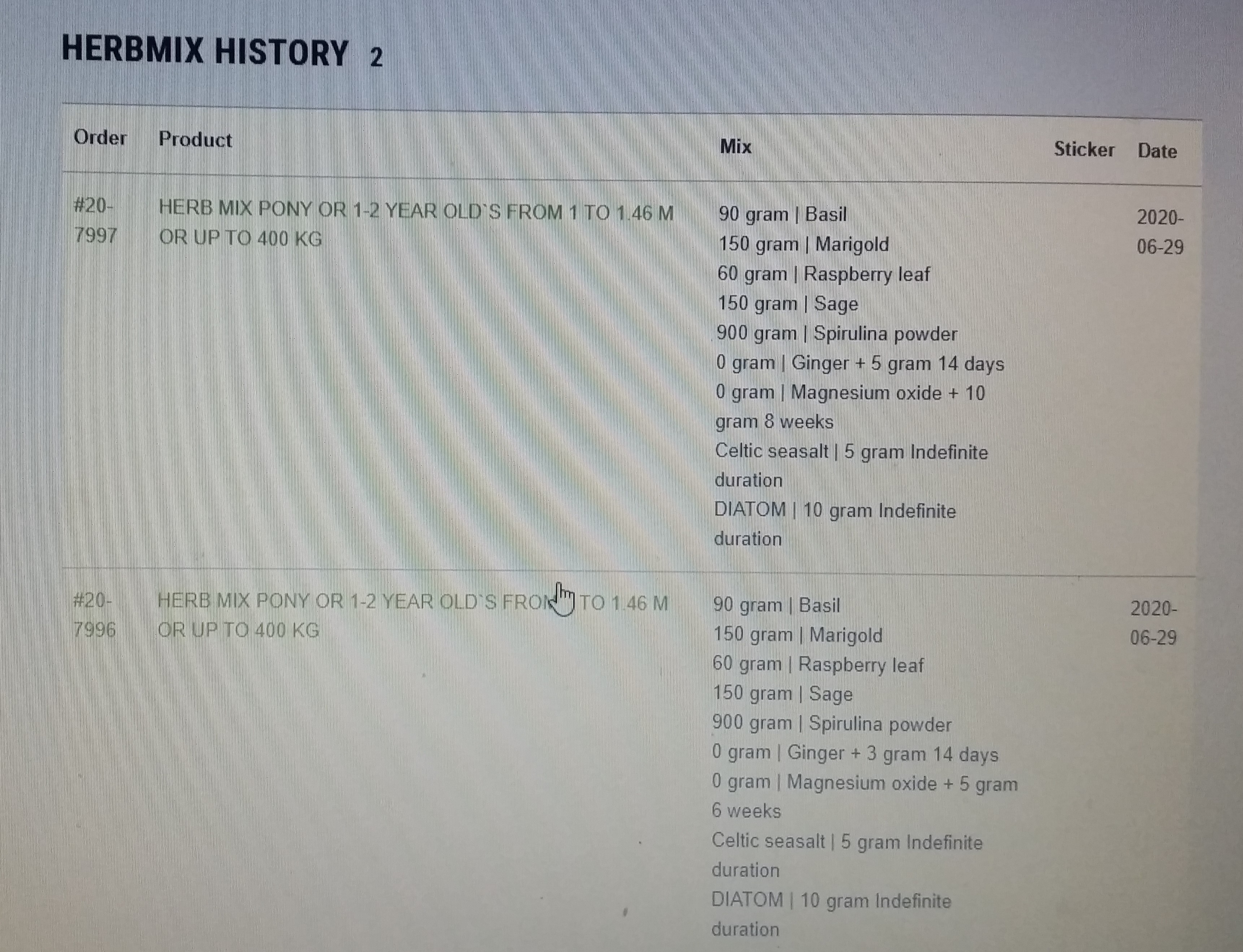1. Why don't I know in advance what's in the herb mix?
Each mix is measured separately for each individual. We will also measure again when you order a new mix for that individual. In our experience the need changes continuously, very rarely horses select the same mix twice in a row. Measuring takes us the most time, we will only do that after we have received the order. That is why we cannot say in advance what your horse will choose. In the herbal wiki you can find more information about which herbs we have (had) in our collection.
2. You have many herbs in the collection, but I do not see some of them in the list, why is that?
The herbal collection has developed over the years. We still often add herbs to test. Sometimes it turns out that this is a good addition and it is more often selected by the horses, but we also have herbs that are never chosen. These will eventually be removed from the test set. Some of these herbs can still be found in the herbal wiki.
3. What does the result/sticker look like and what about the dosage?
The herb mix is composed as optimally as possible, so you do not have to give a lot of it per day, often much less than is recommended on other websites. For an average horse of 400 to 700 kg, we stick to 600 grams of herbs for 5 weeks. Sometimes there are additives, for example the magnesium oxide and spirulina powder. If these are in the mix, then you will give more grams per day.

Here you will find an example of our stickers. Under the heading composition you will also find herbs such as ginger, curcuma and cinnamon, which we always give for a shorter period. Everything under composition is included in the mix. The products under the advice section are useful supplements, which you have to purchase yourself. We also sell a number of products separately and can supply them with the herb mix on request. In the comments you can read what the herb mix does.
4. Where can I find the results of the measurement?
Go to My Horses in your account and click View on the horse whose details you want to view. Here you will find the button sticker. All stickers of the mixes that your horse has had in the past remain available here.


5. Do I always have to weigh the amount of herbs in grams? Can I use a standard measuring spoon for the herbs? Why does it seem that there are more herb in the bag the last time and now there are less?
Yes, you have to weigh with every new bag. Herbs can vary in volume, a hand of burdock root or fennel seed is much heavier than a hand of blackberry leaf or marshmallow leaf. Because the composition changes every time, the volume also changes. In addition, there are sometimes varying amounts of magnesium oxide in the mix, so that you have to give 23 grams per day from one bag and 22 grams from the other bag. A smart solution is to use a cup that you mark again and again, or a weighing spoon.
6. My horse does not want to eat the herbs, what should I do?
This can be for several reasons: the horse is not used to herbal flavours and needs to get used to them, or there are strong tasting herbs in the mix. Sometimes it happens that a horse really does not like a herb. The choice of herbs is based on what the horse's body needs and not so much on what a horse likes. Do you have a picky horse? Please indicate this clearly and we will check extra!
Always start a new mix slowly, just a little bit at first. If the horse eats the food neatly, but he / she drops the herbs, than you can moisten the food so that the herbs stick to each other. With strong tasting herbs you can try to give them with a little more food so that the taste is somewhat diluted. This often works well for horses that like a mash or products that you soak. If the horse really does not want it, you can steep the herbs into a tea and mix the tea with the feed.
7. Is giving 1 herb mix enough?
Herbs have a supportive effect, so they take a little longer before they start to have an effect, compared to for example medication. In addition, the horse's needs change continuously, when a horse is in constructive training, he could initially select a mix for strengthening the body and later on a mix that supports recovery and blood flow. The effect is ultimately the same, because it moves better and lasts longer, but one mix has much less effect than mixes that follow each other nicely. We see the best results with horses that are given herbs for a longer period of time.
8. Do I have to order a new herb mix immediately after 5 weeks?
If you have a horse with (chronic) pain and joint complaints, PPID or intestinal problems, we recommend that you order the mixes straight after the 5 weeks so that the horse does not relapse in the meantime. Analgesic herbs or herbs that we use for PPID, like medication, must remain at the correct concentration in the blood to do their job. Then it is best to order a week before the last mix runs out, so that we have enough time to take the measurement and get the mix to you before your herbs are used up. If your horse does not have that kind of problem, it may be a few days. Keep in mind the delivery time!
9. Do I always have to check the food? How often should that be?
We start every new horse with a free feed measurement because we like to give the most complete advice possible. When a horse gets inappropriate food and is given herbs, the herbs will never be able to do their job so well. If the digestion is not optimal, the horse cannot absorb the nutrients from herbs optimally. In horses that are basically healthy, a feed measurement is only necessary when there are changes, for example more or less training, different roughage or going on the pasture. For horses that have more problems or have to lose or gain weight, it is wise to have the feed checked again after 10-15 weeks and adjusted if necessary. We can also include roughage in the feed measurement.
10. I have to change the food, how can I do that?
The best way to change it slowly, we usually recommend a period of two weeks for this. If your horse is sensitive to new food, it can take more time. For example, give a quarter of the new food for 4 days and a quarter of the old food less, then 5 days half / half and then 5 days three-quarters new and a quarter old. Is your bag of old food used up earlier? Then you only follow the build-up schedule of the new food and give a few days less food in total. Building and dismantling is particularly important for large quantities or the dismantling of very grain-rich food. This is not necessary when changing from one balancer to another.
11. Are herbs intended for every day or only for problems?
The beauty of herbs is that they fall within nutrition and not simple foods or supplements. They support the body with the right nutrients and do not have an as strong effect as an isolated substance. They are also rich in fiber, vitamins and minerals. That makes them a very useful part of the ration. By having horses eat herbs, we give them back a piece of their natural food, when they grow up with herbs and many different plants, they are constantly selecting! Balanced nutrition keeps the horse healthier and you can avoid common problems. Herbs can of course also be used for problems to help the horse get back to health, which means that the horses health wasn`t optimal before.
12. What reactions can you see on the horse after starting with a new herb mix?
When solving (long-term) problems, the horse can react strongly to a herb mix. Not because herbs work so strongly (with a few exceptions), but because the health of the horse is already balanced on a narrow line. Things that we regularly encounter are bumps on the skin, being slow or tired, looking for a lot of rest, changing manure or temporarily moving less smoothly due to the removal of waste products. These are natural reactions that the body must go through in order to clean up and find a better balance. Unless the reaction is really strong, we do not advise to stop the herbs, maybe just to screw the dosage down a bit. We always appreciate to be informed of similar reactions, we can immediately include this in your horse's file.
